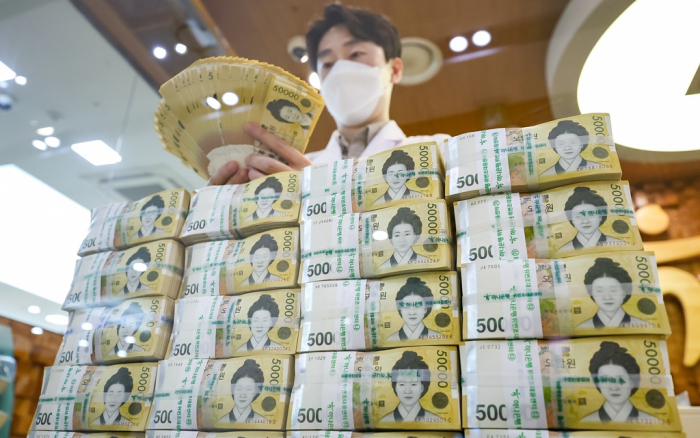Samsung, Hyundai amass record-high levels of cash
S.Korea’s top 50 companies raise holdings of cash and cashable assets to an all-time high of $122 billion in 2021
By Mar 24, 2022 (Gmt+09:00)
LG Chem to sell water filter business to Glenwood PE for $692 million


Kyobo Life poised to buy Japan’s SBI Group-owned savings bank


KT&G eyes overseas M&A after rejecting activist fund's offer


StockX in merger talks with Naver’s online reseller Kream


Mirae Asset to be named Korea Post’s core real estate fund operator



Major South Korean companies such as Samsung Electronics Co. and Hyundai Motor Co. have accumulated more cash than ever before amid growing uncertainties such as global supply disruptions and rising interest rates. They are also preparing money for investment in future businesses.
The country’s top 50 companies listed on the Kospi by market capitalization excluding financial institutions and state-run firms held a record-high 49 trillion won ($122 billion) in cash and cashable assets as of end-2021, up 23.4% from 120.6 trillion won a year earlier, according to The Korea Economic Daily’s analysis on their filings to the Financial Supervisory Service. The growth was also the largest in history.
Hyundai ramped up cashable assets by 29.7% to an all-time high of 12.8 trillion won last year. It was the first time for South Korea’s top automaker to hold more than 10 trillion won in cashable assets, with their earlier high-cash levels hovering around 8 trillion-9 trillion won when its operating profit hit record highs in the early 2010s.
Samsung, the world’s top memory chipmaker, raised cash holdings by 32.8% to 39 trillion won. Hyundai Heavy Industries Co. increased cash holdings by 62.6% to 2.1 trillion won through an initial public offering despite an operating loss of 800.3 billion won. Amorepacific Corp.'s cash holdings fell 256.1 billion won, but its liquid assets including deposits and beneficiary certificates that can be used in the short term rose by 368.4 billion won.
Major South Korean companies’ cash and cashable assets
Unit: Trillion won
Samsung Electronics
Samsung SDI
Hyundai Motor
LG Electronics
Graphics by Jerry Lee
Source: Filings to Financial Supervisory Service
Only five companies such as Samsung C&T Corp. and LG Innotek among the 50 firms reported declines in their cash holdings compared to the ones before the COVID-19 outbreak.
'WE WANT ONLY CASH'
South Korean companies are increasingly issuing bonds and new shares to raise cash. Last year, companies sold a total of 46.7 trillion won in corporate bonds, including net issuances of 13.4 trillion won. Several companies raised billions of dollars selling new shares. Korean Air Lines Co. and Hanwha Solutions secured 3.3 trillion won and 1.4 trillion won, respectively, through sales of new shares.
Corporates this year focused on raising cash holdings rather than repaying debts despite higher interest rates. They issued a net 3 trillion won in corporate bonds, as well as about 10 trillion won in commercial papers and short-term debts in the first two months of 2022, according to Bank of Korea data. Local banks’ loans to major companies increased by 4.8 trillion won in the January-February period.
“Companies had been expected to cut corporate bond issuances due to surging interest rates, but they are actively selling the bonds, saying current interest rates are the lowest,” said an investment banking industry source.
Some conglomerates such as Shinsegae, SK, CJ and Hanwha sold or liquidated their properties to raise cash.
That came as uncertainties surrounding business conditions grew amid the war in Ukraine and surging inflation, industry sources said. Companies also amassed cash to shift their core businesses to eco-friendly and digital sectors and deal with industrial changes in the post-pandemic era, according to the sources.
“Companies are trying as hard as possible not to reduce cash holdings even when they make major investments. They are looking for financial investors or establishing joint ventures for those projects,” said a source of a major domestic private equity fund management firm.
Write to Hyun-Il Lee at hiuneal@hankyung.com
Jongwoo Cheon edited this article.
-
 Corporate bondsKorea corporate borrowing costs jump to 8-year peaks
Corporate bondsKorea corporate borrowing costs jump to 8-year peaksFeb 10, 2022 (Gmt+09:00)
4 Min read -
 Corporate bondsCorporates raise record-high $193 bn via stakes, bonds in 2021
Corporate bondsCorporates raise record-high $193 bn via stakes, bonds in 2021Jan 25, 2022 (Gmt+09:00)
2 Min read -
 Mergers & AcquisitionsKorean Air raises $2.9 bn in largest-ever share issue by Korean firm
Mergers & AcquisitionsKorean Air raises $2.9 bn in largest-ever share issue by Korean firmMar 07, 2021 (Gmt+09:00)
2 Min read -
 Capital raisingHanwha Solutions to sell $1.3 bn new shares in clean energy push
Capital raisingHanwha Solutions to sell $1.3 bn new shares in clean energy pushFeb 15, 2021 (Gmt+09:00)
3 Min read


